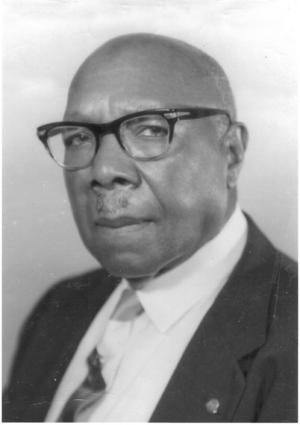Anderson Hunt Brown facts for kids
Anderson Hunt Brown (1880 – 1974) was an important American businessman. He was a very successful African-American man from West Virginia. Mr. Brown also worked hard for civil rights. He helped to make public schools fair for everyone.
Contents
Early Life and Business
Anderson Hunt Brown was born in 1880. His parents, Henry Arnold Brown and Margaret Stewart Brown, were formerly enslaved people. They became free in 1865.
Starting a Business
When his brother passed away, Anderson Brown received some money. He used this money to start his own business. He became a butcher and worked in a meat market. Later, he was able to buy the meat market. He also started renting out a house he owned.
Family Life
Mr. Brown had two children. His son, Willard Brown, grew up to become a lawyer. His daughter, Della Brown Taylor Hardman, became an artist and a professor. She taught at West Virginia State University.
Fighting for Civil Rights
Anderson Brown was a strong supporter of civil rights. This means he believed everyone should have equal rights. He fought against unfair rules that separated people based on their race. These rules were known as Jim Crow laws.
The Library Lawsuit
In 1928, Mr. Brown was part of an important lawsuit. This case was against the Kanawha County Public Library and the Board of Education. Three African-American citizens were not allowed to use the public library. They could not get books or sit inside.
The first court said the library was not breaking the law. But Anderson Brown and other African-American lawyers took the case higher. They went to the West Virginia State Supreme Court of Appeals. This higher court ruled in Anderson Brown's favor. They said that African-American people could not be stopped from using the library. This was a big win for equal rights.
Brown v. Board of Education
Anderson Brown's son, Willard L. Brown, also played a key role in civil rights. He was a lead lawyer for the NAACP in West Virginia. The NAACP is a group that works for civil rights.
Willard Brown helped with the famous U.S. Supreme Court case in 1954. This case was called Brown v. Board of Education. It said that separating students by race in public schools was against the law. This ruling changed schools across the United States. West Virginia was one of 16 states involved in this important case.
The Brown Buildings
Anderson Brown was also known for his real estate work. He owned important buildings in an area called "The Block." This area was a center for African-American life in Charleston. It had homes, businesses, schools, and churches.
Original Brown Building
Mr. Brown worked with Gurnett E. Ferguson to build the first Brown Building. Mr. Ferguson also built the Ferguson Hotel. These two buildings were next to each other. They were very important places for social and business life in "The Block."
Second Brown Building
In the 1960s, a fire damaged the Ferguson Hotel. Later, Mr. Brown built a second Brown Building. This new building was finished in 1971. All the work on this building was done by African-American businesses and workers.
For a few years before he passed away in 1974, Anderson Brown had an office in this new building. His son, Willard, and his daughter, Della, also had offices there. Other offices in the building included a barber shop, a doctor's office, and government offices.
 | Bayard Rustin |
 | Jeannette Carter |
 | Jeremiah A. Brown |


